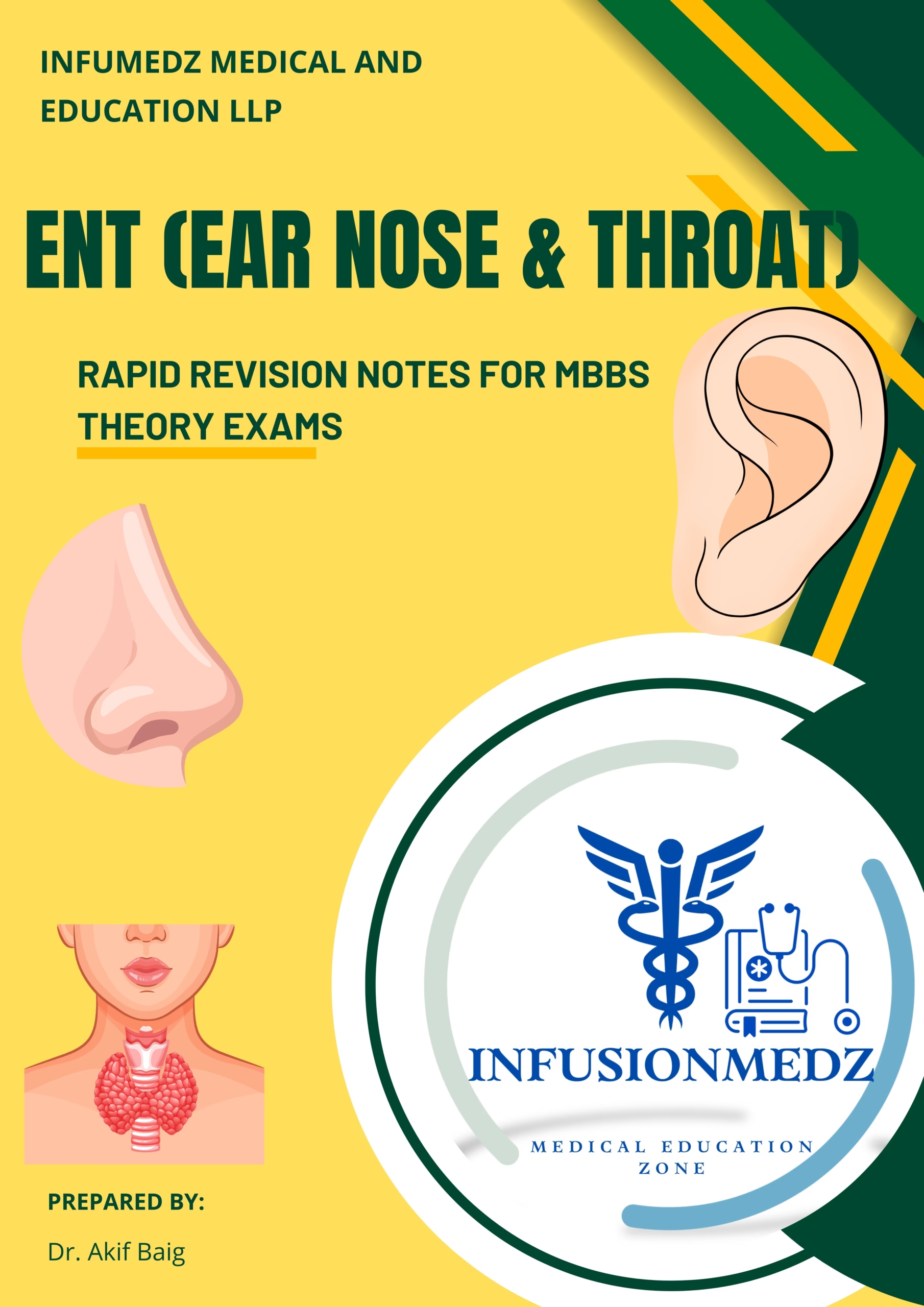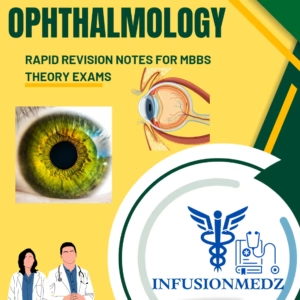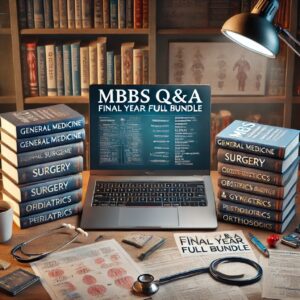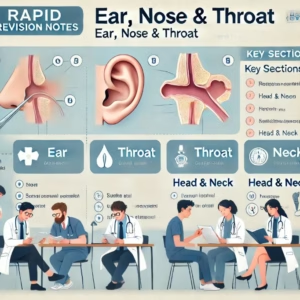Description
I. EAR
1. Anatomy & Physiology
- Divisions: External ear, middle ear, inner ear.
- Hearing Pathway: Sound transmission from tympanic membrane → ossicles → cochlea → auditory nerve → brain.
- Balance System: Vestibular apparatus, semicircular canals, otolith organs.
2. Common Ear Diseases
- Otitis Externa → Pain, swelling, ear discharge.
- Acute Otitis Media (AOM) → Middle ear infection, fever, bulging TM.
- Chronic Suppurative Otitis Media (CSOM)
- Tubotympanic (Safe CSOM) → Central perforation, no complications.
- Atticoantral (Unsafe CSOM) → Marginal perforation, cholesteatoma, risk of complications.
- Complications of CSOM → Mastoiditis, facial nerve palsy, labyrinthitis, brain abscess, lateral sinus thrombosis.
- Otosclerosis → Conductive hearing loss, Carhart’s notch, treated with stapedotomy.
- Meniere’s Disease → Triad: Vertigo, tinnitus, fluctuating SNHL.
- Acoustic Neuroma → Vestibular Schwannoma, progressive SNHL, diagnosed by MRI.
- Facial Nerve Palsy → Otogenic (due to CSOM, trauma), Bell’s palsy (idiopathic).
3. Hearing Tests & Management
- Tuning Fork Tests → Rinne’s, Weber’s, ABC.
- Pure Tone Audiometry (PTA) → Assesses hearing loss.
- Impedance Audiometry → Tympanometry for middle ear assessment.
- Management → Hearing aids, cochlear implants, tympanoplasty, mastoidectomy.
II. NOSE & PARANASAL SINUSES
1. Anatomy & Functions
- Nasal septum → Divided by vomer and ethmoid.
- Turbinates → Superior, middle, inferior; function in air filtration and humidification.
- Paranasal Sinuses → Maxillary, Frontal, Ethmoid, Sphenoid.
2. Common Nasal Conditions
- Rhinitis → Acute (viral, bacterial), Allergic (IgE-mediated, seasonal, perennial).
- Sinusitis → Acute (<4 weeks) vs. Chronic (>12 weeks), presents with nasal blockage, headache, facial pain.
- Nasal Polyps → Associated with allergic rhinitis, Samter’s triad (Asthma, Aspirin sensitivity, Polyps).
- Epistaxis → Most common from Little’s area (Kiesselbach’s plexus).
- Deviated Nasal Septum (DNS) → May cause nasal obstruction, headache, recurrent sinusitis.
- Nasopharyngeal Angiofibroma → Adolescent males, recurrent epistaxis, vascular tumor.
3. Investigations & Management
- Nasal Endoscopy → For chronic sinusitis, nasal polyps.
- CT PNS → Best for sinus pathology.
- Management → Medical (nasal sprays, antihistamines), FESS (Functional Endoscopic Sinus Surgery), septoplasty, turbinate reduction.
III. PHARYNX & LARYNX
1. Diseases of the Pharynx
- Tonsillitis → Acute (Group A Streptococcus), chronic (indication for tonsillectomy).
- Peritonsillar Abscess (Quinsy) → Unilateral swelling, trismus, requires drainage.
- Obstructive Sleep Apnea (OSA) → Snoring, daytime sleepiness, managed with CPAP or UPPP surgery.
- Pharyngeal Tumors → Squamous cell carcinoma, risk factors include smoking, alcohol.
2. Diseases of the Larynx
- Acute Laryngitis → Viral inflammation of vocal cords, hoarseness.
- Laryngotracheal Trauma → Hoarseness, airway compromise.
- Recurrent Laryngeal Nerve Palsy →
- Unilateral → Hoarseness.
- Bilateral → Stridor, requires tracheostomy.
- Laryngeal Cancer → Most common is squamous cell carcinoma, presents with progressive hoarseness.
3. Laryngeal & Pharyngeal Surgeries
- Tonsillectomy → Indications: ≥7 episodes/year, Quinsy, OSA.
- Tracheostomy → Emergency airway management.
- Microlaryngeal Surgery (MLS) → For vocal cord nodules, polyps.
IV. HEAD & NECK
1. Neck Masses
- Midline → Thyroglossal Cyst (Moves with swallowing & tongue protrusion).
- Lateral → Branchial Cyst, Tuberculous Lymphadenitis, Metastatic Nodes.
- Goiter & Thyroid Disorders → Hypothyroidism, Hyperthyroidism, Thyroid Cancer.
2. Salivary Gland Diseases
- Sialadenitis → Infection, commonly affects the submandibular gland.
- Sialolithiasis → Salivary duct stones, submandibular gland most affected.
- Parotid Tumors →
- Pleomorphic Adenoma (Most common benign).
- Mucoepidermoid Carcinoma (Most common malignant).
V. CLINICAL METHODS & INVESTIGATIONS
1. ENT Examination
- Otoscopic Examination → Assess TM, perforations, cholesteatoma.
- Nasal Endoscopy → For sinusitis, nasal polyps, tumors.
- Indirect Laryngoscopy → For vocal cord lesions, laryngeal cancer.
2. Imaging in ENT
- HRCT Temporal Bone → For CSOM, cholesteatoma, facial nerve pathology.
- MRI Brain & IAC (Internal Auditory Canal) → For vestibular schwannoma, SNHL.
- CT PNS (Paranasal Sinuses) → For sinusitis, nasal polyps, tumors.
3. Audiological Investigations
- Pure Tone Audiometry (PTA) → Degree and type of hearing loss.
- Impedance Audiometry (Tympanometry, Acoustic Reflexes) → Middle ear function.
- Brainstem Evoked Response Audiometry (BERA) → For retrocochlear pathology (e.g., Acoustic Neuroma).




Reviews
There are no reviews yet.